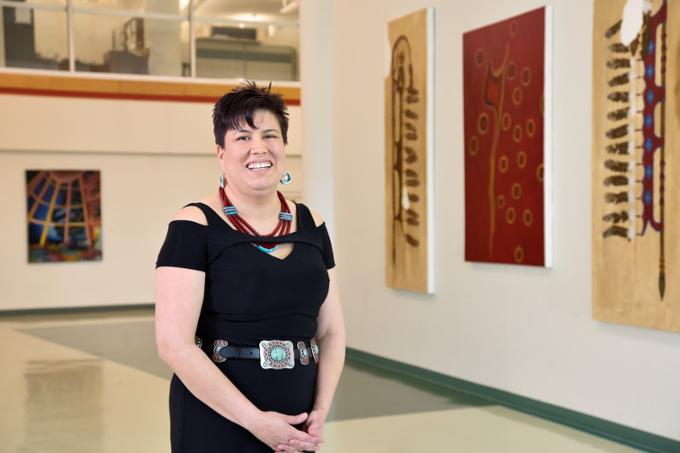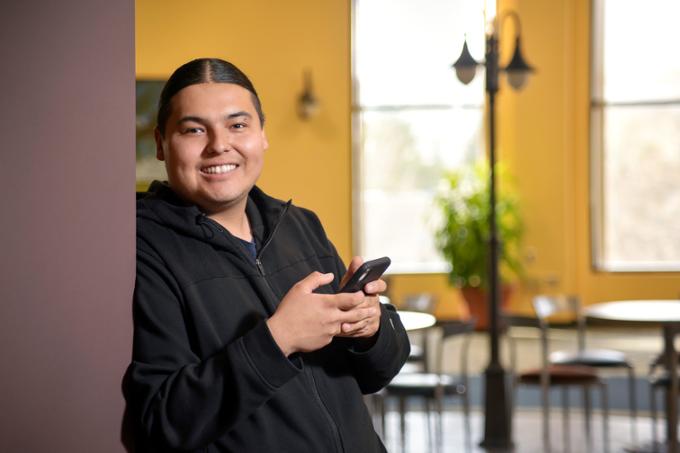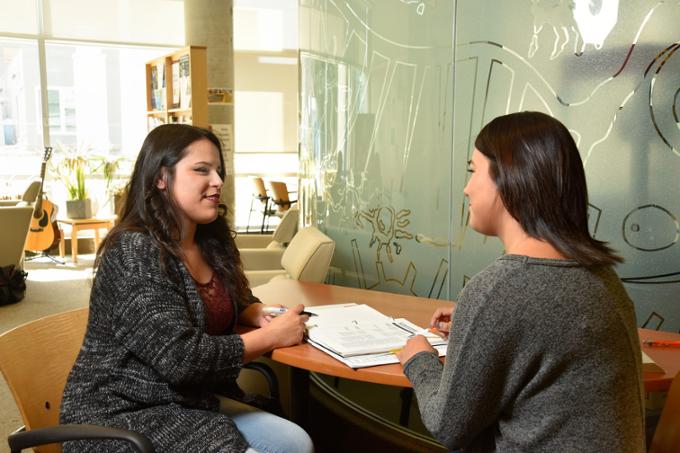Indigenous Connection
This Land Acknowledgment is part of an ongoing conversation as we work toward reconciliation.
The University of Regina and its federated colleges are on Treaty 4 and Treaty 6 — the territories of the nêhiyawak, Anihšināpēk, Dakota, Lakota, and Nakoda peoples, and the homeland of the Michif/Métis nation.
We recognize that, as an institution founded by settlers, we benefit from being on this land. We are grateful for the privilege to learn, teach, and work here. We demonstrate our commitment to reconciliation by incorporating Indigenous knowledge and world views in our research, teaching, and studies to ensure that there are increased economic, social, and creative opportunities for current and future generations. It is our responsibility to strengthen relationships with Indigenous communities and build a more inclusive future.
ta-tawâw Student Centre
The ta-tawâw Student Centre provides a welcoming atmosphere that supports Indigenous ways of being-knowing-doing. Our mission is to provide a shared space for all First Nations, Métis, and Inuit students at the University of Regina. We encourage all students and visitors to gather, study, laugh, and learn with one another.
The vision of the ta-tawâw Student Centre is to guide Indigenous students within four directions of learning:
- Academic success programming
- Cultural teachings and ceremony opportunities
- Career support and employee engagement
- Leadership training events
Indigenous-Focused Academics


The University of Regina partners with the First Nations University of Canada; Yukon University in Whitehorse, Yukon Territory; and the Gabriel Dumont Institute (GDI), to offer Indigenous-focused programs in a variety of disciplines:
- Indigenous Education
- Indigenous Literatures in English
- Indigenous Fine Arts
- Indigenous Health Studies
- Indigenous Languages and Linguistics
- Indigenous Social Work
- Indigenous Studies
- Reconciliation Studies
- Saskatchewan Urban Native Teacher Education Program
- Yukon Native Teacher Education Program
Truth & Reconciliation
Truth & Reconciliation stands among the University of Regina’s five areas of focus described in our strategic plan — entitled “All Our Relations” / kahkiyaw kiwâhkômâkaninawak. We are committed to reconciliation through our teaching, research, learning and service efforts across our campuses and throughout the province.
Office of Indigenous Engagement
The office is a leader of Indigenous excellence and is responsible to and seeks direction from various partners and community members throughout Regina and the province of Saskatchewan.
- Academic Indigenous excellence
- Indigenous-centred research
- Governance and administration
- Student success
- Community engagement
Introduction to Powwow
Offered once each semester, Intro to Powwow features live dance performances and showcases powwow’s spiritual, physical and cultural benefits.
Gain a contextual and historical framework for powwow, by exploring its development and organization.
Learn the significance and meaning behind the dances.
Explore different elements of the regalia.
All students, Indigenous or not, are welcome to attend and learn more about powwow.
Tipi Raising Competition
Each September, the ta-tawâw Student Centre invites the University campus community, students and staff to compete in the Glen Anaquod Annual Memorial Tipi Raising Competition.
This fun event provides hands-on cultural teaching, emphasizing the importance of the tipi culturally, educationally and in the spirit of teamwork.
No tipi raising experience necessary. Everyone is welcome!
Neekaneewak Living Learning Community
At the University of Regina, you can choose from 10 different living-learning communities (LLCs) if you decide to live on campus.
Offered in partnership with the ta-tawâw Student Centre, the Neekaneewak Living Learning Community provides Indigenous students with:
- Mentorship
- Cultural events
- Academic programming
- Leadership development opportunities to engage with community, both on and off campus
Dates to Remember

Frequently Asked Questions
When you self-declare, you help U of R gather accurate information about our Indigenous students and their needs based on their culture and traditions. It helps us better serve you, and it drives funding targets to provide those support services.
When you self-declare, the students who came before you extend their hands to you — just as you will for those who follow in your footsteps.
When you self-declare, you also gain access to scholarships only for Indigenous students. More on funding and scholarships below.
Indigenous identities in Canada include the following groups and may require supporting documentation as outlined:
First Nation - Status Indian
- Certificate of Indian Status (Status Card) issued by Indigenous and Northern Affairs Canada (INAC)
- Letter from a government-registered First Nations community verifying membership to a First Nation
- First Nation - Non-Status Indian
- Letter of support from Band or First Nation on appropriate letterhead and signed by a Band Administrator
- Long-form birth certificate with supporting documents of Indigenous identity from a parent or grandparent
Métis
- Métis citizenship card issued by a member Nation of Métis National Council of Canada
- Letter or citizenship card from on of the member Nations of the Métis Settlements General Council or Métis Nation of Saskatchewan (MN-S)
- Genealogy documentation as per outlined by MNCC or MN-S
Inuit
- Inuit Beneficiary Card
- Letter from a government organization such as Inuvialuit Regional Corporation, Nunavut Tunngavik Makivik Corporation or Nanutsiavut in Labrador
- Letter of Support from Indigenous and Northern Affairs Canada (INAC) or Nunavut Tunngavik Incorporated
Other options:
- Letter from a recognized First Nation community similar to that provided for a person who has Status
- Letter from the Congress of Aboriginal Peoples (CAP) and/or one of its affiliated provincial organizations
- A letter of support from a First Nation, Métis and Inuit (FNMI) organization that is a legal entity, who can attest to Indigenous citizenship and community connection
Once an application is complete, with all required documents received, most applicants receive their admissions decision as a letter attached to an email within about two weeks. Applicants with complex educational backgrounds may take longer. If you apply during peak application season, it may also take a little longer.
We will work with you to figure out your next steps, which may include:
- Taking a specific high school course to boost your admission requirements
- Using an alternative pathway to your desired program
Absolutely! Check out our undergraduate awards information to see all your options.
Email U of R’s Enrolment Services at enrolment.services@uregina.ca to let us know. We can arrange to defer your admissions application fee until you receive band funding.
You can contact an enrolment counsellor for questions related to domestic undergraduate admissions via email: enrolment.services@uregina.ca
